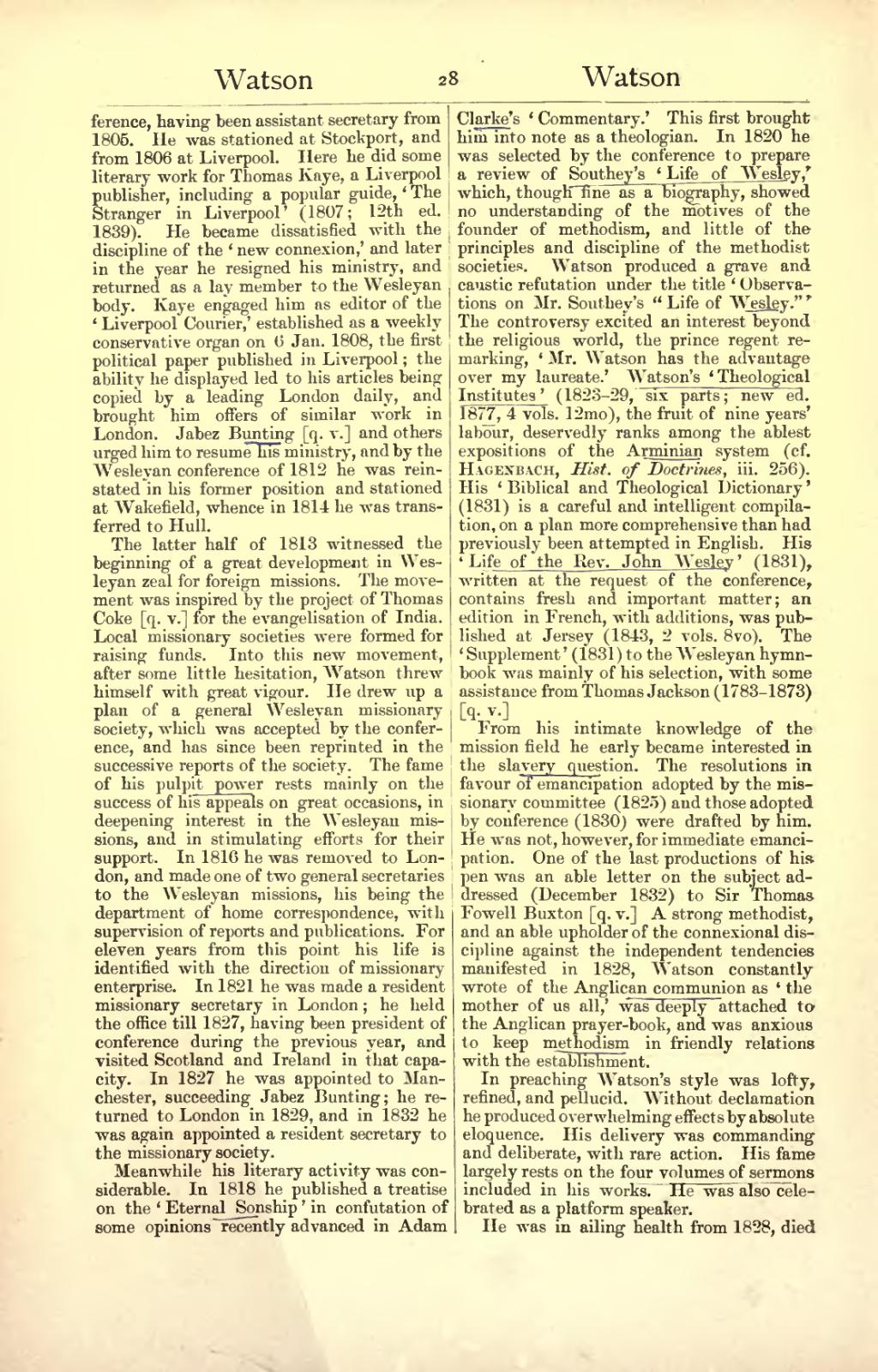ference, having been assistant secretary from 1805. He was stationed at Stockport, and from 1806 at Liverpool. Here he did some literary work for Thomas Kaye, a Liverpool publisher, including a popular guide, 'The Stranger in Liverpool' (1807; 12th ed. 1839). He became dissatisfied with the discipline of the 'new connexion,' and later in the year be resigned his ministry, and returned as a lay member to the Wesleyan body. Kaye engaged him as editor of the 'Liverpool Courier,' established us a weekly conservative organ on 6 Jan. 1808, the first political paper published in Liverpool; the ability he displayed led to his articles being copied by a leading London daily, and brought him offers of similar work in London. Jabez Bunting [q. v.] and others urged him to resume his ministry, and by the Wesleyan conference of 1812 he was reinstated in his former position and stationed at Wokefield, whence in 1814 he was transferred to Hull.
The latter half of 1813 witnessed the beginning of a great development in Wesleyan seal for foreign missions. The movement was inspired by the project of Thomas Coke [q. v.] for the evangelisation of India. Local missionary societies were formed for raising funds. Into this new movement, after some little hesitation, Watson threw himself with great vigour. He drew up a plan of a general Wesleyan missionary society, which was accepted by the conference, and has since been reprinted in the successive reports of the society. The fame of his pulpit, power rests mainly on the success of his appeals on greet occasions, in deepening interest in the Wesleyan missions, and in stimulating efforts for their support. In 1810 he was removed to London, and made one of two general secretaries to the Wesleyan missions, his being the department of home correspondence, with supervision of reports and publications. For eleven years from this point his life is identified with the direction of missionary enterprise. In 1821 he was made a resident missionary secretary in London; he held the office till 1827, having been president of conference during the previous year, and visited Scotland and Ireland in that capacity. In 1827 he was appointed to Manchester, succeeding Jabex Bunting; he returned to London in 1829, and in 1832 he was again appointed a resident secretary to the missionary society.
Meanwhile his literary activity was considerable. In 1818 he published a treatise on the 'Eternal Sonship' in confutation of some opinions recently advanced in Adam Clarke's 'Commentary.' This first brought him into note as a theologian. In 1820 he was selected by the conference to prepare a review of Southey's 'Life of Wesley,' which, though fine as a biography, showed no understanding of the motives of the founder of methodism, and little of the principles and discipline of the methodist societies. Watson produced a grave and caustic refutation under the title 'Observations on Mr. Southey's "Life of Wesley." The controversy excited an interest beyond the religious world, the prince regent remarking, 'Mr. Watson has the advantage over my laureate.' Watson's 'Theological Institutes' (1823-29, six parts; new ed. 1877, 4 vols. 12mo), the fruit of nine years labour, deservedly ranks among the ablest expositions of the Arminian system (cf. Hagenbach, Hist. of Doctrines, iii. 256). His 'Biblical and Theological Dictionary' (1831) is a careful and intelligent compilation, on a plan more comprehensive than had previously been attempted in English. His 'Life of the Rev. John Wesley' (1831), written at the request of the conference, contains fresh and important matter; an edition in French, with additions, was published at Jersey (1843, 2 vols. 8vo). The 'Supplement' (1831) to the Wesleyan hymnbook was mainly of his selection, with some assistance from Thomas Jackson (1783-1873) [q. v.]
From his intimate knowledge of the mission field he early became interested in the slavery question. The resolutions in favour of emancipation adopted by the missionary committee (1825) and thoseadopted by conference (1830) were drafted by him. He was not, however, for immediate emancipation. One of the last productions of his pen was an able letter on the subject adressed (December 1832) to Sir Thomas Fowell Buxton [q. v.] A strong methodist, and an able upholder of the connexional discipline against the independent tendencies manifested in 1828, Watson constantly wrote of the Anglican communion as 'the mother of us all,' was deeply attached to the Anglican prayer-book, and was anxious to keep methodism in friendly relations with the establishment.
In preaching Watson's style was lofty, refined, and pellucid. Without declamation he produced overwhelming effects by absolute eloquence. His delivery was commanding and deliberate, with rare action. His fame largely rests on the four volumes of sermons included in his works. He was also celebrated as a platform speaker.
He was in ailing health from 1828, died

